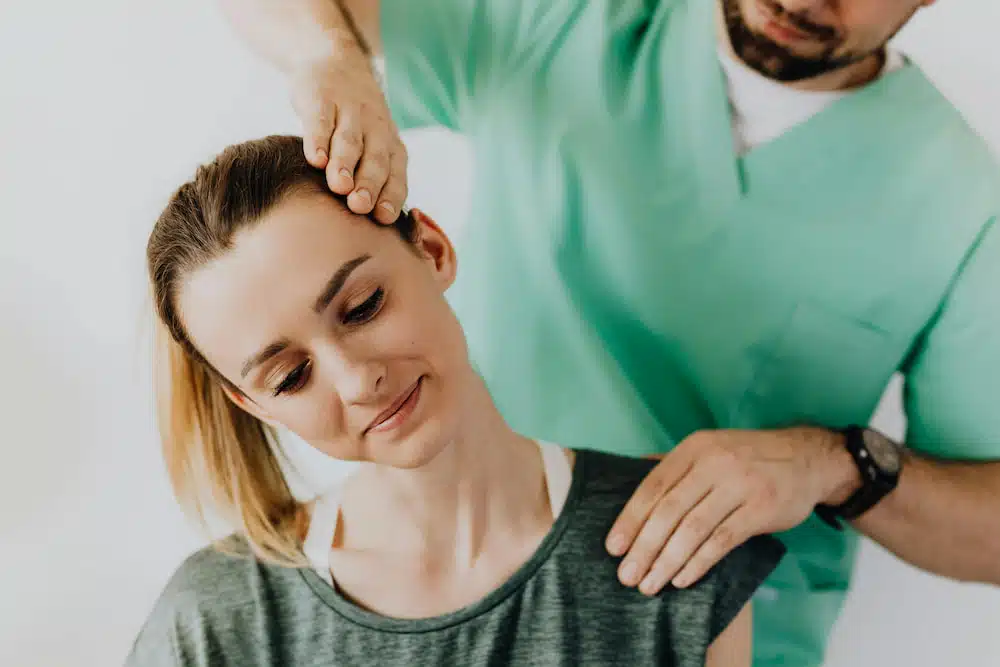Waking up with neck stiffness after hours in an uncomfortable position can throw off your whole day. Most of the time, it eases up on its own within a day or two.
But while most cases resolve quickly, neck pain is surprisingly a frequent concern—around 15% of U.S. adults report it in any three-month period. For many, it recurs and can sometimes become a long-term issue that affects comfort and mobility.
Fortunately, rehabilitation programs can target the root causes of neck stiffness, restoring mobility, easing pain, and helping prevent future flare-ups. Let’s learn more about rehabilitative neck pain treatments and determine whether this approach is right for you.
Neck stiffness stems from various causes, and understanding your specific triggers is the first step toward finding the right treatment.

These factors don’t necessarily cause stiffness on their own. However, if left unchecked, they can lead to worse conditions that make it difficult and more painful to move your neck freely.
Many patients turn to rehabilitation to manage their symptoms and address the underlying causes of stiff neck. Here’s why:
Some treatments mask pain and discomfort, but your stiff neck could return when these solutions finally wear off. Rehabilitation generally doesn’t have the same problem.
In addition to easing symptoms, it also addresses the root causes of neck stiffness, whether from misalignments, tension, or strains. This supports lasting recovery and lowers the risk of recurrence.
Physical rehabilitation uses targeted neck exercises to release restrictions and strengthen weakened muscles, improving your overall mobility and balance. Stretches also help ease joint tightness and muscle tension to enhance flexibility and provide neck pain relief.

By building strength, flexibility, and mobility, rehabilitation makes your body more resilient. This reduces the risk of future neck pain, joint restrictions, and related injuries, supporting a more comfortable, pain-free life.
Rehabilitative stretches and exercises improve neck flexibility and mobility. Manual techniques, such as soft tissue therapy and chiropractic adjustments, help reduce tension and misalignments that contribute to neck stiffness.
Together, these approaches equip your body with the strength, coordination, and range of motion needed to prevent neck pain flare-ups.
Rehabilitation encompasses various treatment approaches and techniques, each with its own method for resolving a stiff neck depending on its underlying cause.
These techniques will comprise your rehabilitation program depending on your needs and the extent of your neck injury. In turn, you can experience faster and more lasting results, with a lower risk of reinjury.
Your healing begins at home. Consider implementing these changes into your lifestyle even before visiting a chiropractor to start your journey toward recovery.

Dr. Eric Stumpff of Stumpff Chiropractic has spent years helping people find lasting relief from stiff, painful necks. His approach blends targeted exercises, hands-on therapies, and lifestyle support to develop rehabilitation plans tailored to each patient’s unique body, condition, and goals.
What sets his care apart is the focus on long-term healing, not just hiding symptoms. At Stumpff Chiropractic, the goal isn’t a quick fix; it’s helping you move through life with less pain and more freedom.
If neck stiffness has become part of your daily routine, it’s time for a change. Rehabilitation is an ideal treatment option, a reliable way to restore mobility and ease pain, while also preventing future problems. With consistent support, you can get back to living and feeling like yourself again.
Stumpff Chiropractic offers trusted rehabilitative treatments in Plantation, FL, supporting patients on their path to recovery from neck stiffness and related concerns. Ready to feel better? Schedule a consultation with us today and stop letting stiffness run the show.
